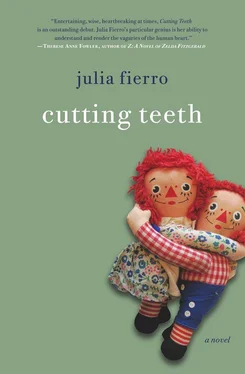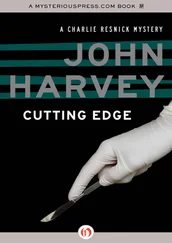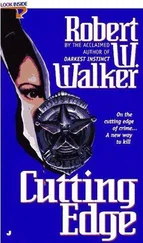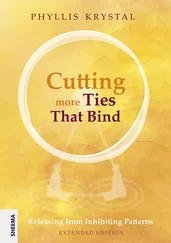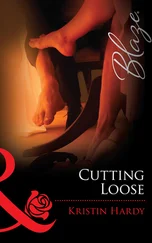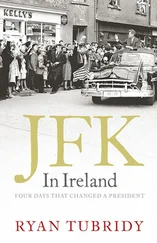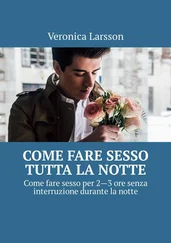The dewy Tiffany-scented scene cracked with a high-pitched little-boy voice. Rip opened his eyes to the cool, still darkness, and Hank’s moon-shaped face looked down at him.
“Sleep with me, Daddy,” Hank demanded.
“This is a teeny tiny bed, buddy,” Rip protested, even as he was pulling back the thin blanket, making room for Hank.
Hank climbed in, and Rip was comforted by the familiar scent of jelly sandwiches and fruity shampoo.
“Pacis,” Hank demanded.
“Come on, now,” Rip whispered into the boy’s neck. “We talked about this. Pacis are for babies. Are you a baby?”
Rip knew Hank was thinking. The boy was silent, his breathing slowed.
“No. I a big boy.”
“And who uses pacis?” Rip asked again, adding gruffness to his voice.
“Babies,” Hank said before he hiccuped.
Rip knew a wail was imminent.
“Okay.” Rip sighed. And then added, his lips tickled by the soft fuzz of Hank’s earlobe, “Don’t tell Mommy.”
“’Kay, Daddy. Cross your heart,” Hank said. Rip heard the pacifier-anticipating glee in his boy’s voice. He knew Hank was smiling.
Rip rolled off the bed, crawling around the dresser until he found the diaper bag, and, at the bottom, the plastic baggie he’d hidden with the three pacifiers he’d sterilized before they left home. One for Hank’s mouth, one extra (just in case) and one for Hank’s nose. Hank liked to pop one in his mouth and half suction/half balance another on the bridge of his nose, switching the two until he fell asleep — a ritual Rip found both odd and ingenious.
He tucked the two pacifiers in Hank’s sticky palm.
The pacifiers were Rip’s golden ticket. Insurance. The one sure way to soothe Hank during a meltdown, and Rip knew he was the one who wasn’t ready to retire them.
“Arm around, Daddy. Arm around.”
The pacifier garbled his words, but Rip knew what Hank was saying. It was the same every night, and Rip knew he wouldn’t want it any other way. Rip curled his body around Hank until there wasn’t an inch between them. Like one teaspoon inside a tablespoon, he thought. Until his ass hung off the narrow cot, and there was room only for his breathing and Hank’s breathing. No room for thoughts of Tiffany.
“Okay, buddy,” Rip said, “Quiet down now. Sleep time.”
That was how Grace found them each night when she returned home from work, her suit wrinkled from the subway ride. She stood in the doorway, blew a kiss to Hank if he was awake, gave Rip a weak wave if Hank was asleep, then retreated to the living room, where Rip had placed a plate of food for her on the coffee table. Rip didn’t mind doing it all, or doing it alone. He relished the effect the nighttime rituals had on Hank, the predictability that made Hank’s limbs loosen and his eyes shine with security. Every parenting book Rip had read preached the importance of consistency, especially at bedtime. Rip fed, bathed, and dressed Hank for bed (always in that order), read him three books, and then they brushed their teeth together.
“Make sure you do your fives,” Rip said every night, which meant brushing for five seconds front, back and on each side.
Of course, Rip wasn’t beyond reminding Grace what a trial it was to be the sole caretaker day in and day out, but he did miss her. He missed the way she’d let him rest his head in the curve of her thigh while they watched movies. The thrill of spontaneous sex on a Saturday morning, followed by sleeping in past noon. But what else was there to miss? Certainly not the crap job at Goldman Sachs, a temp IT gig Grace had found him, with just enough responsibility that he’d been able to memorize his audition lines when his boss wasn’t hovering, but which had earned just enough to pay a quarter of their rent and tuition for his improv class at the Upright Citizens Brigade.
Now, as he breathed in the sugary scent of Hank, he knew there was little in life before Hank to be missed. Still, now that he was technically unemployed, Grace had begun to treat him like some loafer crashing on her couch, instead of the university-trained thespian she had met (and even admired, he’d once believed) in college. In conversation with other couples, and at painfully dull dinners with her colleagues, Grace explained that Rip was a “stay-at-home dad,” her manicured fingertips curling to indicate quotes. Her laugh was a quiet hiss that both included him and alienated him although he always laughed along, assuming this was the kind of teasing grown-up couples did.
At the small, New England, liberal arts college he and Grace had attended, Rip had felt as if he belonged. There, in a class of less than a hundred, he’d been the lead in every theater production — Seymour in Little Shop of Horrors, Pippin in Pippin, Tevye in Fiddler on the Roof. He’d been named Most Musical and Most Likely to Be on TV. Ever since, he’d been adrift in a world of cliques whose language he didn’t speak. Social life in college had been simpler — he had hung with a crowd and met Grace, a business major with an appreciation for the arts, who had made him believe his performance in Jesus Christ Superstar was something after all, that he might have a chance of making it in the city with its off-off Broadway theaters. After graduation, he’d shuffled from audition to audition, and in the post-9/11-economy slump, the only work he could find were temp gigs at Grace’s firm.
Then they couldn’t get pregnant. It wasn’t that Rip was sterile, the doctor explained, his sperm had mobility issues. Another man’s swimmers were pumped into his wife’s body. Some random dude’s discharge. Something Rip normally wiped away with paper towel, or washed off in the shower. Rip knew he should think of it as sacred stuff, the seed that sprouted life, but it felt dirty each time Grace was inseminated, and words like cum and jism filled his head. He secretly preferred the later in vitro procedures, though he knew it was more painful for Grace and a helluva lot more pricey, but at least some anonymous guy’s ejaculate wasn’t filling his wife’s holy harbor.
He’d begun to wonder if he’d ever feel necessary again.
Then Hank was born, and with the mewling brown-skinned boy came a new life for Rip. Once Rip’s role officially cemented to stay-at-home dad (finally, he’d joked, he had a title!), he was needed day and night. Life-or-death needed. If not for Rip, baby Hank might have rolled over on his stomach and suffocated, succumbed to the mysterious SIDS the pediatricians spoke of in hushed tones.
Babies are the most helpless creatures in the world , Rip had read in the go-to baby book, a loan from a fellow “primary caretaker” at his mommy and me yoga class. The author was a California pediatrician, who, in his author photo, held a serene infant swaddled like an Eskimo baby. The gist was that babies were born three months too early. They could barely handle learning to breathe, eat, and shit at the same time, so why would parents expect them to know how to fall asleep on their own, or soothe themselves? Holy crap, Rip had thought in genuine epiphany, and from that moment on, he had looked upon Hank with sympathy and was a true convert to the “attachment parenting” method. His sole mission was to soothe baby Hank. Hey, Rip remembered thinking, he needed a six-pack some days to soothe himself.
Rip wore the Baby Bjorn baby carrier most of each day, and after months of living life with Hank dangling from his chest, Rip wondered (not in front of Grace, of course) if he knew a little bit about what it might feel like to be pregnant.
He wore Hank on walks, on the subway, when he cooked, when he vacuumed, and even, on occasion, when he took a shit. Baby Hank was a whole lot happier. Rip had worn Hank every night from five to eight, what the veteran mommies at the playground called the witching hour, when, according to old-world maternal superstition, babies’ crankiness peaked. Rip and Hank bobbed to his old alt-rock mixed tapes as Hank fussed, farted, and face-mashed until he finally surrendered to sleep.
Читать дальше
